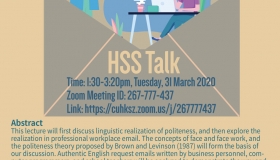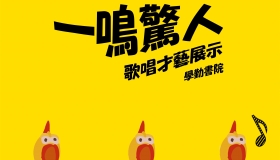Language Art, Thought, and Science
Topic: Language Art, Thought, and Science
Speaker: Prof. Shengli Feng
Date: Mar. 9, Friday
Time: 16:15-17:30
Venue: Governing Board Meeting Room, Dao Yuan Building
Language: Chinese
Abstract:
Language is a talent of human beings. It is an art, thoughts, and science.
As the language of art, namely its artisitic nature, language has various rhyme,different length and speed. Language is the source of art. As an art of languages,verses, ditties, odes and songs are created. Languages are different and unique.
As the language of thoughts, ideological element, language has its world formed by vocabulary , and it has its own logic of sentence configuration. As thoughts on language, there are dialectical thought of the dichotomy structure(Lao Zi and Zhuang Zi)and logic thought of morphological markednes (Aristoteles). Different languages lead to different thoughts.
As the language of science, language has a genic nature of merge structure.Different languages have same structures. As linguistic science, Chomsky’s Revolution in Linguistics and so on.
Viewing language from the perspectives of art, thought and science, we will have deeper understanding of human beings, the source of knowledge, and the creation of present and future thoughts and science.
Speaker’s Profile:
Shengli Feng is Professor of Chinese linguistics at the Chinese University of Hong Kong. He obtained B.A. and M.A. from Beijing Normal University and PhD in linguistics at the University of Pennsylvania.
He served as Professor of the Practice, Director of the Chinese Language Program at Harvard University, and Director of the Harvard-Beijing Academy. He is the founder Prosodic Syntax and his research interests include prosodic literature, register grammar, diachronic syntax of Chinese, Archaic Chinese exegesis and scientific thoughts in Chinese history.
Additionally, he is reviewer of National Nature Foundation, United States, and editor of about ten linguistics and language teaching magazines at home and abroad. He is Editor of Studies in Prosodic Grammar and Co-Editor of Journal of Chinese Linguistics (SSCI-indexed). He has published 10 books (two in English and two translated into English and Korea), and over 120 articles (in both English and Chinese) and has given over 100 invited lectures and conference papers.




